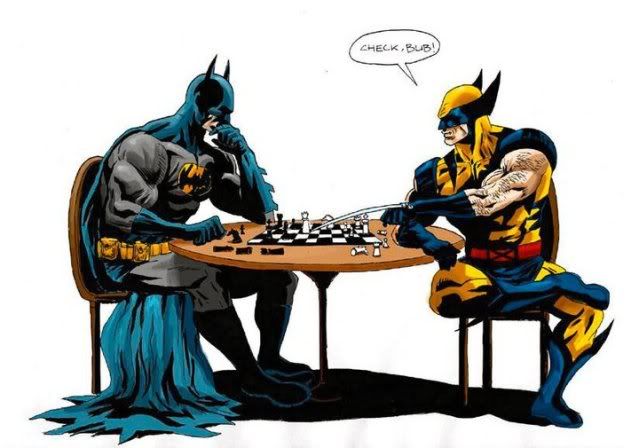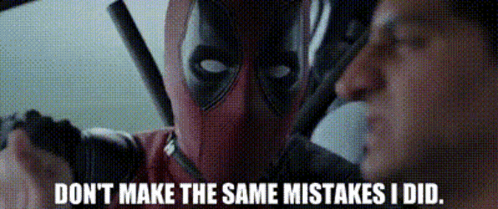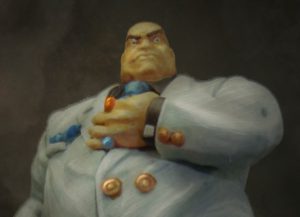
I think a lot about mistakes. Some players lament their dice. Others harp on game balance. I dwell on errors, blunders and punts- the myriad ways I throw away games.
If I were to indulge myself I’d say that makes me a more introspective, serious player. These other guys, they’re always cursing their luck, they don’t understand it’s just statistics. The thing to *really* moan about is what an idiot you were in your last game.
This is nonsense obviously. My preoccupation with bad decisions is just as emotional as my friends’ concern with their dice. I think of myself as smart. Making an intellectual error undermines that. I’m upset by that, so I complain, obsess, tilt. Others believe in natural justice, see their opponent roll 3 crits on a Captain Sam attack, are confronted with the brute randomness of life and baulk.
The only difference here is that we have no control of our dice. We *can* eliminate our mistakes.

But how?
The problem with stopping making mistakes is that, if we see a mistake coming, we generally avoid it.
In a recent loss, I failed to keep track of the score, allowing my opponent to go last on round 4, flip two points and score out 16-9. I immediately realized I had made an error – and that’s the most common time to realize an error, once it’s too late to do anything about it.
So how do we see mistakes before we make them? Understanding the types of mistakes we make can help.

My mistake was actually twofold. I misunderstood the gamestate and failed to realize Deadpool could and should flip the back right Madman point to slow my opponent’s score and advance my own. Instead I overvalued his offense into Cosmic Ghost Rider. I was too concerned about being tabled, and failed to track the score well enough. This is a strategic mistake, a mistake of understanding.
I *also* moved Deadpool closer to Cable in order to tee up a crucial Sacrifice play and keep Cable on the board. Great play right? Thinking ahead, making the most of my strongest pieces, taking advantage of the synergy between Sacrifice and Deadpool’s healing factor and “counts as healthy” injured side
Except I hadn’t taken Sacrifice, opting to leave it out in favor of Brace for Impact this game.
This is a blunder, a mistake of memory really. I understood that I did not have Sacrifice available, but I forgot about that in the heat of the moment.
Check, mate.

This distinction comes from Chess, an amazing source for game theory concepts generally. I’d highly recommend this blog about making fewer mistakes in Chess if you want to know more.
There are several ways to avoid mistakes outlined in the article, but the basic method is:
1.Always identify your opponent’s threats before you start thinking about your own moves.
2.Consider the current role of the piece you want to move, and the consequences of moving it. In other words, think about how your opponent could take advantage of your intended move.
If I had followed this guidance, I could have realized that Beta Ray Bill represented the biggest threat at this stage of the game, because of his ability to flip 2 points simply in an activation.
I could have also seen that Deadpool contesting my home right Madman was also threatening to flip OPs right Madman.
There’s not a direct relationship between Chess theory and Crisis Protocol but there are a lot of transferable concepts, and these ideas help. To simplify further, before you make a move consider what your opponent could do, and what you give up by making that move.
Regrets, I’ve had a few
Crisis Protocol games are particularly influenced by a few commonly recurring types of mistakes. Consider how many of these you’ve made:
Tunneling
Sticking to your plan despite changing circumstances. In my game against Black Order above, my plan was to KO as many of OP’s dudes as possible then score out. This was a great plan until round 4 when we were even on Attrition, OP was ahead on points and had last activation. I needed to pivot at least some of my activations to scoring to stop myself losing.
To avoid this, we should try to consider the overall game shape and who is actually winning if nothing changes. Simply taking the time to write down what the score will be at the end of the turn and checking if someone is going to win would make a huge difference in a surprising amount of games!
The Oversight/the Clanger
Hey, ever made a play to set up Sacrifice, but you didn’t have it in your five? What a coincidence!
Sometimes we formulate a plan and, even though the thought behind them is sound, we build an absurd premise in, because of stress, forgetfulness or lack of practice. This can be the result of overthinking. We build out a complex scenario under time pressure, and as we get to the later stages, we drop an important factor and end up making a terrible decision.
IN my last tournament, I was so fixated on my need to KO Beta Ray Bill with Psylocke, and preoccupied with the round clock which was ticking down I failed to realise I still had another model to activate, and conceded with an almost certain win on board
These mistakes can be avoided by trying to get back to basics and *not* constantly trying for big brain plays. Making the good, simple play is normally correct and honestly if there really is a genius level play to be had, it will probably strike you with absolute clarity. If you *think* you’ve got a great idea, better to check you’ve not actually made a pig’s ear of it.
And always check you’ve used all of your resources before you concede!

Best case scenario thinking
If you’re planning to be ahead on points round one, daze more models than your opponent and retain priority, you’re probably making this mistake.
There’s a lot of ways to fall prey to this. Commonly in MCP you might see someone plan around having success on an unlikely attack, or on holding on to an extract picked up on the midline by an average 3 threat.
This mistake also crops up in larger scale planning, where we fool ourselves in to thinking we’ll grab the extract lead, hold on to more secures and daze more models than our opponent all at the same time.
Ultimately these mistakes all stem from the same error. Planning for the best possible outcome- whether that be through luck or our opponent’s inaction. This is avoidable just by reminding ourselves that our opponent has plans and some amount of them will come to fruition!
The “Sure Thing”
Assuming an attack or other dice roll is a nailed on success, when it may be anything but. I played against a very good player recently who expressed his minor disappointment that Cosmic Ghost Rider has failed to one shot or at least heavily damage Luke Cage round 1. CGR has (with a psychosis token and a winging it token) a 7.4% chance to kill Luke from one attack.
The point isn’t that my opponent was ridiculous to expect this, but just that even good players often overstate the odds on a given attack. We shortcut to “CGR has a reasonable chance to one shot a 3 threat” – which is true of, say, Gambit, who dies 41% of the time to the same attack. But the helpful rules we set for ourselves also mislead us if we let them.
MCP dice are pretty awkward to predict, but having a grasp on the likelihood, through your own statistical knowledge or a tool like mcpdice.com can really improve your evaluation.
To Dream The Impossible Dream
We can work to eliminate mistakes, but perfection is impossible. High level players in all games make errors, and no MCP player is able to commit the time required to even approach perfection.
The sorts of mistakes listed above can be minimized through mental discipline and practice, but they can never be completely removed.
The best advice I came across on reducing mistakes actually came from Poker theory. It went something like: You make mistakes; sometimes you notice them, and sometimes you don’t. But the more you practice and the better your play gets, the less mistakes you’ll make.
This applies to the sort of simple mistakes that will have you kicking yourself for days afterwards, and the more complex and strategic mistakes as well. I recently lost to Convocation, having never played against the Affiliation before. On reflection, I gave my opponent an extra Iron Bound Books turn by KOing his Hand Ninjas when Shadowlands Daredevil had already been dazed.
I did this to generate some power on Cable and not give up priority by dazing Wong. I didn’t even consider this would mean back to back book turns, but that was the key decision on the game. More practice and more research would have helped me understand the matchup and be less likely to make the error.
Get Gud, Get Lucky
So, is it actually helpful to just say “if you improve, you’ll make less mistakes?” Well, maybe. It’s pretty obvious that most players who complain about their luck would be better off thinking about what improvements they could make to their game. But by the same token, I think players like me who dwell on their mistakes would be better served noting the error, giving themselves a break and commiting to practicing more.
I’m going to try to apply to approach to mistakes taken from Chess here to my game, but I’m also going to try simply play more, record my results and discuss my decisions with my opponent whenever I can.
I hope this has been interesting and useful rather than just self-indulgent. Next time out I’ll be back to X-Force topics, so if there’s anything you want to hear about, let me know. Until then, be x-cellent to each other.



